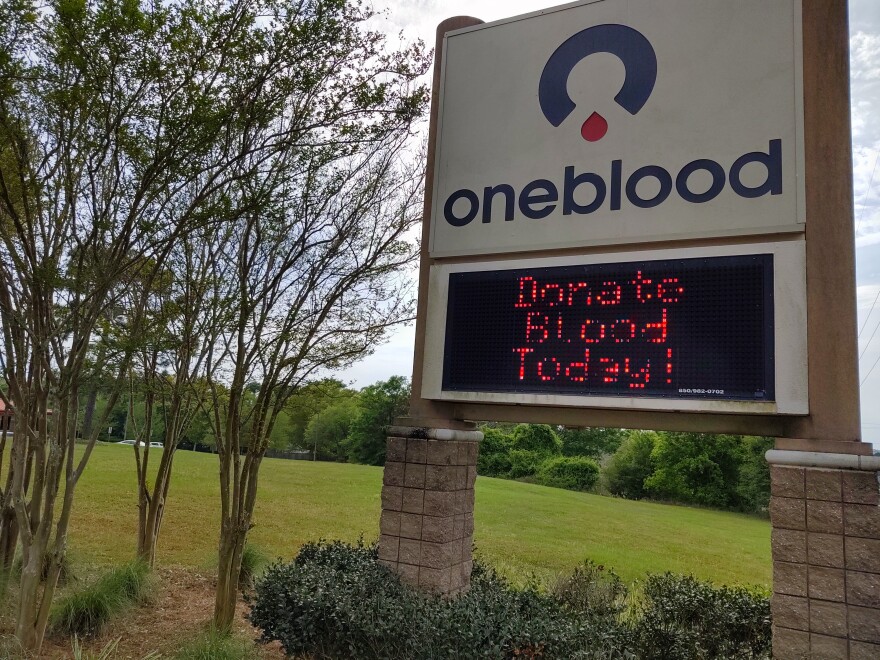OneBlood, a not-for-profit blood center that serves Florida, has announced plans to begin collecting plasma to be used as a potential treatment option for people with “life-threatening” coronavirus infection.
When the program ramps up, OneBlood will be looking for donations of plasma specifically from individuals who have recovered from the coronavirus, so that it can be transfused to people who are very sick due to the disease.
“The treatment is called COVID-19 convalescent plasma,” says Susan Forbes, senior vice president of corporate communications and public relations at OneBlood. “It’s an experimental treatment that the FDA (U.S. Food & Drug Administration) has given emergency permission to be used in critically ill patients with the coronavirus.”
Convalescent plasma is plasma that’s collected from patients who’ve also contracted and have recuperated from an infection like COVID-19.
“This all has to do with antibodies. People who recover from coronavirus have developed antibodies to the virus and those antibodies remain in the plasma portion of their blood,” Forbes explained. “So, by transfusing the plasma that contains those antibodies into a person still fighting the virus, it can provide a boost to their immune system and help them recover.”
According to Forbes, convalescent plasma therapy is not new. It’s been used as a medical treatment for more than 120 years.
“The idea of using plasma from survivors really dates back to the 19th century and has been used to treat the flu, measles, polio, chicken pox, and others, to varying degrees of success,” said Forbes. “So, because there is no cure or drug right now to be used with coronavirus, this was something that has been used in other situations that have shown some success.”
As a result, the FDA has given emergency permission for use of this plasma therapy to determine if it will help patients who are critically ill with a life-threatening version of coronavirus.
As one of the largest blood centers in the country, OneBlood already has the technology in place to be able to collect, test, and process plasma from donors. And, the organization is working quickly to get the processes in place for collection of COVID-19 convalescent plasma in the coming weeks.

“We’re already working closely with the Florida Department of Health to identify people who have recovered from COVID-19 to be potential donors,” proclaimed Forbes. “We’re also cooperating with the federal government and anticipates participating in a national-level initiative to be able to provide convalescent plasma when and where it is needed.”
Forbes says potential donors will have to meet all the usual screening criteria for blood donation, a person at least 16 years of age, in good health, and weighing at least 110 pounds. Plus, additional FDA criteria must be passed to be approved. Those criteria include:
- COVID-19 convalescent plasma must only be collected from recovered individuals if they are eligible to donate blood
- Required testing must be performed and the donation must be found suitable
- Prior diagnosis of COVID-19 documented by a laboratory test
- Complete resolution of symptoms at least 14 days prior to donation
- Have a negative result for COVID-19
- Meet all standard FDA blood donation requirements
- As with all transfusions, the donor and the patient will need to have compatible blood types
Like donors, the recipients of the plasma will also have to meet FDA criteria in order to qualify to receive this therapy for treating life-threatening COVID-19.
OneBlood expects to begin plasma collection from qualified donors in the next few weeks. Once that occurs, they will offer the therapeutic agent to hospitals to treat severely ill coronavirus patients.
When it comes to whole blood donations, the onset of the coronavirus pandemic earlier this month halted many blood collection efforts. Blood donations are always needed, but Forbes says right now the supply is now in good shape.
Over the past couple of weeks, over 2,500 blood drives have been canceled through May, which account for over 40,000 blood donations. With the tremendous response we have seen, the blood supply has been stabilized, and we have now moved to an appointment-based only system with our donors.
This new appointment-based system will likely continue for the foreseeable future.
Forbes says appointments help with social distancing by limiting the number of people at the blood center at any one time. They shorten wait times. Additionally, they provide a good gauge of how many people are donating each day, so OneBlood can ensure they’re collecting enough blood for hospital needs.


